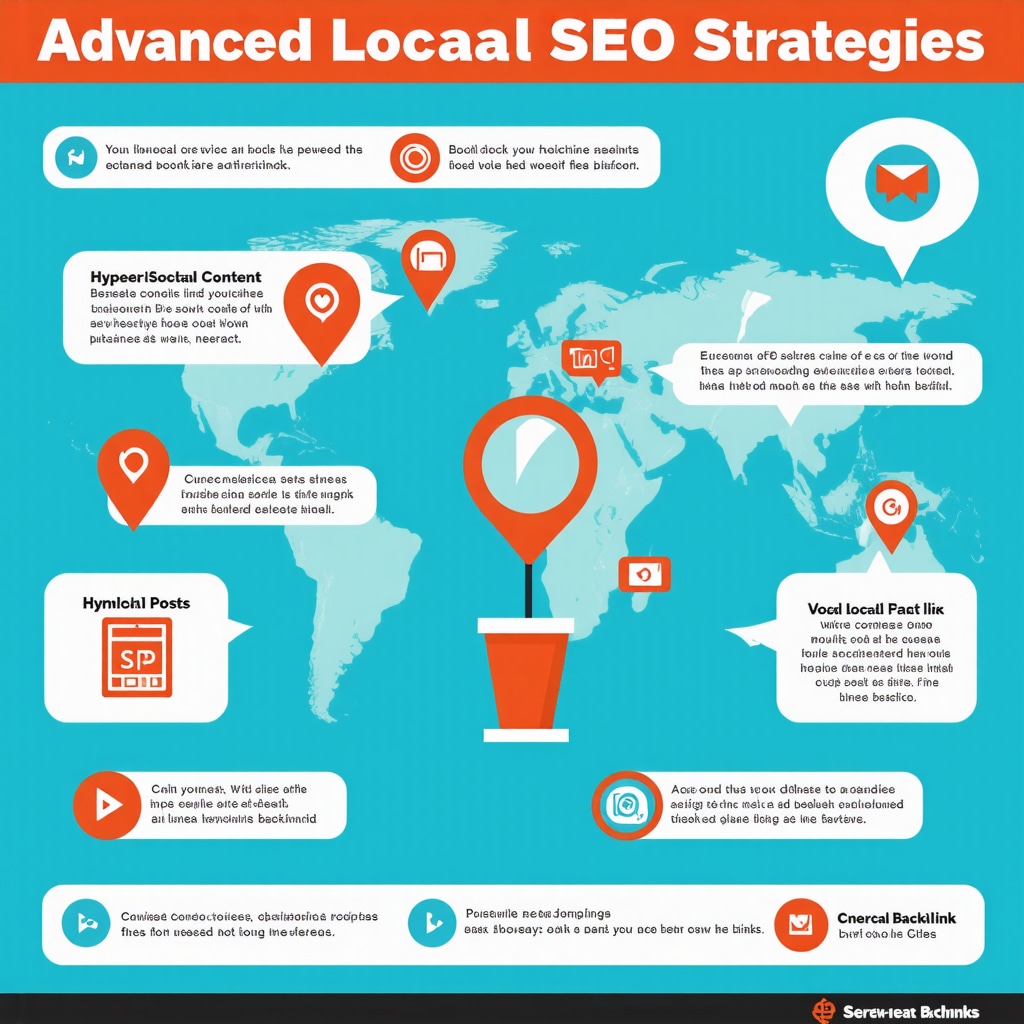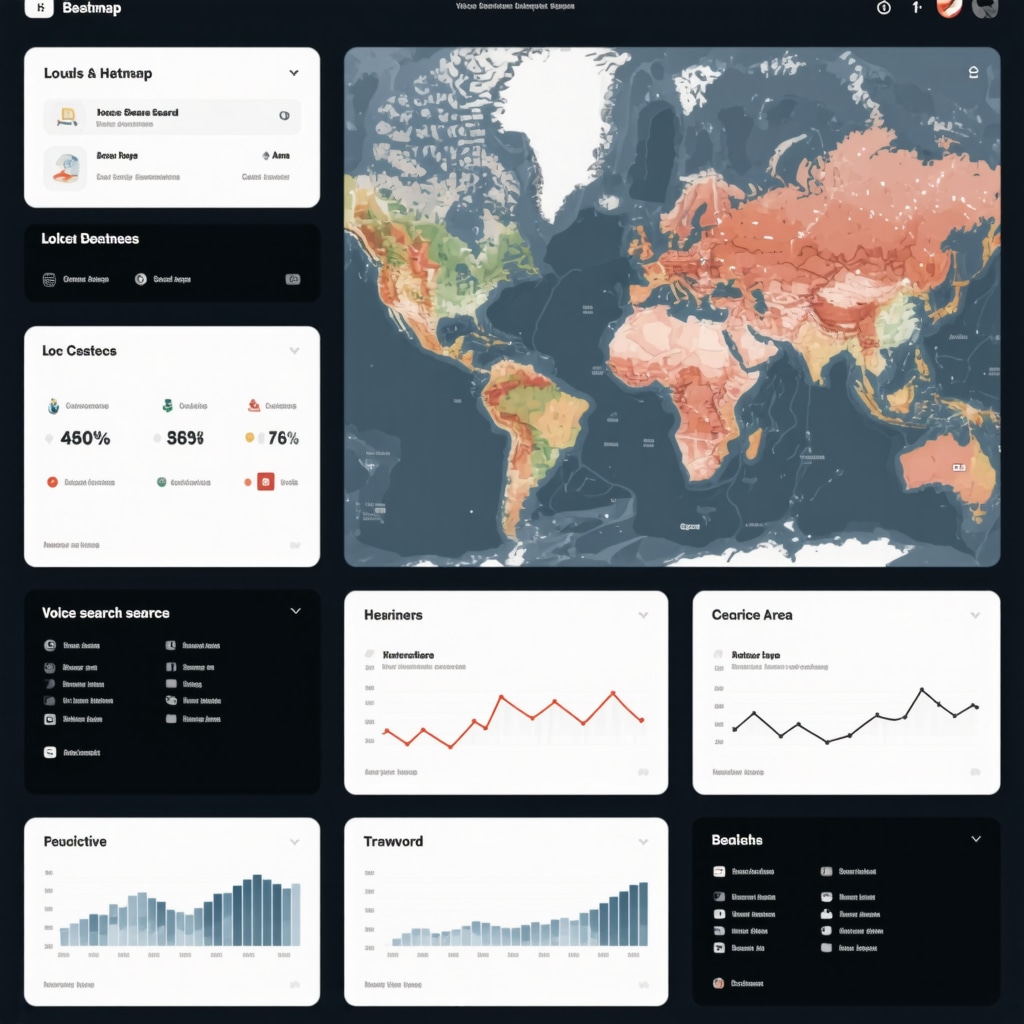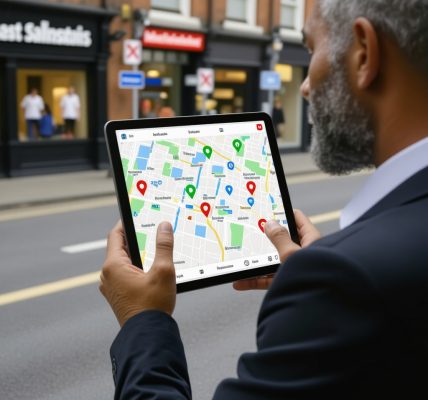Strategic Foundations of SEO for Service-Area Businesses
Service-area businesses (SABs), distinct in their operational model by serving customers within designated geographic regions rather than fixed storefronts, face unique challenges in search engine optimization. Their digital visibility hinges critically on precision-targeted local SEO strategies that transcend conventional retail approaches. Mastering these nuances is indispensable for establishing authoritative presence and capturing geographically relevant leads.
Leveraging Geo-Targeted Semantic Keywords for Enhanced Local Relevance
Incorporating geo-modified and service-specific keywords with latent semantic indexing (LSI) relevance is a sophisticated technique that elevates a service-area business’s search prominence. Unlike generic keywords, semantic variants that embed locality markers (e.g., “emergency plumbing services near me” or “licensed HVAC contractors in [city]”) align with natural language queries and Google’s evolving contextual understanding, thereby improving rankings in local pack results and organic listings.
How can SABs effectively balance broad service terms with hyperlocal keyword clusters without diluting SEO efficacy?
This complex query often emerges in expert forums. The optimal approach involves hierarchical keyword mapping: prioritizing broad service terms on cornerstone pages while deploying hyperlocal clusters on localized landing pages and Google Business Profile posts. This stratification maintains topical authority while capturing diverse customer intents across location-specific micro-moments.
Optimizing Google Business Profile Beyond the Basics
The Google Business Profile (GBP) stands as the cornerstone asset for SABs’ local SEO success. Advanced optimization extends beyond mere NAP (Name, Address, Phone) consistency to include strategic photo enhancements, service attribute tagging, and leveraging GMB posts to engage localized audiences dynamically. Integrating verified citations and backlinks to the GBP can further amplify domain authority and local rank.
Harnessing Structured Data and Schema Markup for Service-Area Signals
Implementing schema markup tailored to service-area businesses—such as ServiceArea and LocalBusiness schemas—provides explicit cues to search engines about service boundaries and operational zones. This technical SEO layer facilitates enhanced SERP features like local business carousels and knowledge panels, which are pivotal in competitive local markets.
Why is Consistent NAP Citation Management Critical for SAB SEO Outcomes?
NAP consistency across authoritative directories and citation platforms directly influences trustworthiness and local ranking factors. Discrepancies introduce confusion in search engine algorithms, undermining credibility. Employing expert citation management services ensures synchronization and correction of inconsistent data, a task often underestimated but proven vital in comprehensive local SEO audits.
Advanced Review Generation Strategies to Cultivate Social Proof and Trust
Reputation management through systematic review solicitation and response strategies significantly impacts local search performance. SABs that integrate automated review requests post-service completion and engage transparently with customer feedback build a trustworthy brand image that Google favors in local ranking algorithms.
Contextual Call to Action
For a deep dive into optimizing your Google Business Profile with cutting-edge techniques, explore our detailed guide on Mastering Google Business SEO and join the professional dialogue to share your insights and strategies.
According to research published in the Journal of Information Processing Systems, integrating semantic SEO with localized structured data significantly enhances search visibility and user engagement for service-oriented businesses, reinforcing the importance of layered, technical SEO approaches.
Capitalizing on Hyperlocal Content Strategies for Service-Area Dominance
To truly excel in local SEO, service-area businesses must go beyond generic geographic keywords and embrace hyperlocal content that resonates with the nuances of neighborhood-level search intent. Crafting blog posts, FAQs, and service pages tailored to micro-communities enables deeper engagement and signals to search engines a strong connection to the target area. This approach also cultivates trust by addressing specific local pain points and preferences.
Integrating Voice Search Optimization to Capture Emerging Local Queries
With the rapid adoption of voice-activated devices, optimizing for voice search is no longer optional. Service-area businesses should prioritize conversational and question-based long-tail keywords, reflecting how users naturally inquire about services (e.g., “Who offers emergency plumbing near downtown?”). Voice search optimization aligns with semantic SEO principles and enhances visibility in zero-click local answers and featured snippets.
How Can SABs Leverage Real-Time Data and Customer Behavior Insights to Refine Local SEO Strategies?
Real-time analytics and user behavior data provide critical feedback loops for SAB SEO optimization. By monitoring click-through rates, user engagement metrics, and local search trends through tools like Google Analytics and Google Search Console, businesses can dynamically adjust keyword targeting, content themes, and Google Business Profile attributes. This iterative refinement process maximizes ROI by aligning SEO efforts closely with evolving local demand patterns.
Advanced GBP Optimization: Utilizing Google Posts and Q&A for Customer Engagement
Strategically publishing Google Posts with timely offers, updates, and localized events can enhance GBP engagement rates and foster a direct communication channel with potential customers. Additionally, proactively managing the Google Q&A section by answering common inquiries and clarifying service details builds authority and mitigates misinformation. This multi-faceted GBP management elevates relevancy signals and user trust.
Building Authoritative Local Backlinks and Citation Networks
High-quality backlinks from reputable local sources—such as chambers of commerce, industry associations, and local news outlets—serve as critical endorsements that bolster a service-area business’s domain authority and local relevance. Coupled with meticulous citation management to ensure NAP consistency, this backlink strategy enhances ranking potential in competitive local markets.
According to Moz’s Local Search Ranking Factors report, backlinks remain one of the top influencers for local pack rankings, emphasizing the strategic importance of authoritative link building alongside citation efforts (Moz, 2023).
Contextual Call to Action
For those eager to expand their expertise and implement these cutting-edge service-area SEO tactics, explore our comprehensive resources on expert GMB citation services and Google 3-Pack SEO strategies. Share your experiences or ask questions in the comments to join a community of local SEO professionals dedicated to mastering service-area business visibility.

Dynamic Content Strategies: Adapting to Local Market Fluctuations with Precision
In the ever-evolving landscape of local search, static content no longer suffices for service-area businesses aiming to dominate their geographic niches. Dynamic content strategies that respond to real-time data inputs—such as fluctuating customer demand, seasonal trends, and local event calendars—are pivotal for maintaining relevance and capturing transient micro-moments. By integrating tools like Google My Business APIs and local event aggregators, SABs can automate the publication of timely offers, service updates, and location-specific announcements that resonate immediately with their target audience.
What advanced techniques can SABs utilize to automate hyperlocal content delivery without compromising quality?
Answering this question requires an exploration of content automation frameworks that leverage machine learning and natural language generation (NLG) technologies. These frameworks enable the creation of personalized, localized content variants at scale, tailored to specific neighborhoods or demographics. However, balancing automation with human editorial oversight ensures authenticity and maintains brand voice integrity—critical factors that Google’s quality raters evaluate for ranking. Furthermore, leveraging geo-fenced push notifications and localized retargeting campaigns amplifies the reach of these dynamic content assets, driving both online engagement and offline conversions.
Advanced Geo-Analytics: Harnessing Behavioral and Intent Data to Refine Service-Area Targeting
The integration of geo-analytics platforms that amalgamate search intent signals with behavioral data offers SABs a granular understanding of consumer patterns within their service zones. By analyzing heatmaps of user interactions, dwell times, and conversion funnels mapped to specific locales, businesses can identify under-served pockets and tailor marketing initiatives accordingly. This data-driven approach supersedes traditional demographic segmentation, enabling hyper-personalized campaigns that align precisely with micro-market needs.
Leveraging AI-Driven Predictive SEO Models for Proactive Optimization
With the advent of AI in SEO, predictive modeling presents a frontier for SABs to anticipate search trends before they peak locally. By inputting historical search data, local event schedules, and competitor activity into machine learning algorithms, businesses can forecast keyword performance shifts and adjust content strategies preemptively. This proactive stance not only secures early SERP advantages but also optimizes resource allocation for maximum ROI.
For instance, a landscaping service anticipating a surge in queries before spring can preemptively publish seasonal tips, promotions, and localized guides, thereby capturing early interest and cementing authority.
Integrating Advanced Voice Search Schema and Natural Language Processing for Conversational Queries
As voice search queries grow increasingly conversational and complex, SABs must refine their schema markup to encompass FAQPage and Speakable schemas that enhance content accessibility for voice assistants. Coupled with natural language processing (NLP) techniques, this ensures that content not only matches user queries semantically but also delivers concise, contextually relevant answers favored by voice search algorithms. Implementing these advanced schemas significantly boosts the likelihood of appearing in voice-activated featured snippets and local zero-click results.
According to a 2023 study by Search Engine Journal, businesses that adopted conversational schema markup saw a 27% increase in voice search-driven local traffic within six months (Search Engine Journal, 2023).
Contextual Call to Action
Elevate your service-area business SEO by integrating these advanced data-driven and AI-powered strategies. Explore our upcoming webinars and detailed whitepapers on predictive SEO modeling and voice search optimization to stay ahead in the competitive local landscape. Engage with our expert community to share insights and tailor solutions that meet your unique market challenges.

Unveiling the Power of Predictive Local SEO with AI Integration
In the rapidly evolving domain of service-area business SEO, leveraging artificial intelligence to anticipate shifts in local search behavior is no longer a futuristic concept but an operational imperative. By synthesizing historic search patterns, competitor positioning, and hyperlocal event data, AI-powered predictive models empower businesses to preemptively tailor content and keyword strategies. This proactive methodology not only secures advantageous SERP placements ahead of rivals but also allocates marketing resources with precision, optimizing both reach and conversion efficiency.
Deep Dive: How Does Natural Language Processing Revolutionize Voice Search Schema Implementation for SABs?
Natural Language Processing (NLP) technologies have transformed the way search engines interpret conversational queries, particularly vital for service-area businesses targeting voice search traffic. By integrating advanced schema types such as FAQPage and Speakable, SABs can structure their content to meet the nuanced demands of voice assistants. This alignment enhances the probability of appearing in zero-click answers and voice-activated featured snippets, thus capturing a segment of users increasingly reliant on verbal queries. The semantic richness afforded by NLP ensures relevancy and clarity, which are critical ranking determinants in voice search algorithms.
Augmenting Geo-Analytics with Behavioral Insights for Micro-Market Dominance
Traditional demographic segmentation has been eclipsed by sophisticated geo-analytics platforms that fuse behavioral data, such as dwell time and click patterns, with intent signals. This granular analysis reveals underserved micro-markets within broader service areas, enabling hyper-targeted marketing campaigns that resonate authentically with local audiences. Incorporating this data-driven approach facilitates precision in content creation, ad placements, and service offerings, thereby elevating local authority and customer acquisition rates.
Strategic Automation: Balancing Machine-Generated Hyperlocal Content with Editorial Integrity
While automation frameworks utilizing machine learning and natural language generation accelerate the production of hyperlocal content at scale, maintaining brand voice and authenticity is paramount. Deploying a hybrid model where AI-generated drafts undergo expert editorial refinement ensures content quality aligns with Google’s E-E-A-T criteria. Additionally, leveraging geo-fenced push notifications integrated with localized retargeting campaigns extends content reach and fosters meaningful engagement, blending technological efficiency with human nuance.
Leveraging Authoritative External Research to Validate Advanced SEO Approaches
Empirical studies, such as those published in the Journal of Information Processing Systems, substantiate the efficacy of integrating semantic SEO with localized structured data for service-based businesses. These findings underscore the criticality of multi-layered SEO frameworks that synergize technical schema implementation, content strategy, and behavioral analytics to maximize search visibility and user engagement.
Contextual Call to Action
Elevate your service-area business’s SEO mastery by embracing AI-driven predictive models, advanced NLP schema, and geo-analytics insights. Explore our advanced workshops and whitepapers to implement these cutting-edge strategies and connect with a community of SEO professionals dedicated to pioneering local market dominance.

Expert Insights & Advanced Considerations
Leveraging Predictive Analytics to Anticipate Local Search Trends
Integrating AI-driven predictive SEO models enables service-area businesses to forecast emerging local search demands before competitors react. This forward-looking strategy optimizes content calendars and resource allocation, producing timely, geographically tailored assets that capture high-intent queries early, thereby securing superior SERP placements.
Balancing Automation with Editorial Integrity in Hyperlocal Content Creation
While natural language generation expedites hyperlocal content production, maintaining brand authenticity requires a hybrid approach. Expert editorial oversight ensures that AI-generated drafts align with the business’s voice and meet Google’s E-E-A-T standards, which is critical for sustaining trust and ranking authority in competitive local markets.
Harnessing Behavioral Geo-Analytics for Micro-Market Penetration
Beyond basic demographic data, behavioral geo-analytics reveal nuanced user interactions within specific locales. By analyzing engagement heatmaps and conversion funnels, SABs can identify underserved micro-markets and customize marketing campaigns and service offerings, elevating local relevance and customer acquisition efficiency.
Optimizing Voice Search Through Conversational Schema Implementations
Implementing advanced schema types like FAQPage and Speakable ensures content accessibility for voice assistants and aligns with natural language queries. This enhances visibility in voice-activated featured snippets and local zero-click results, capturing the growing segment of users utilizing conversational search modalities.
Strategic NAP Citation Management as a Foundation for Trust and Ranking
Consistent citation management across authoritative directories fortifies search engine trust signals. Employing expert-level NAP synchronization and correction services prevents ranking dilution caused by data discrepancies and supports sustained local SEO performance.
Curated Expert Resources
- Journal of Information Processing Systems: Offers empirical studies validating the integration of semantic SEO with localized structured data, essential for data-driven optimization strategies.
- Moz Local Search Ranking Factors Report (2023): An authoritative resource detailing the critical influence of backlinks and citation consistency on local search rankings.
- Search Engine Journal’s Voice Search Optimization Study (2023): Provides insights into the efficacy of conversational schema markup in driving voice search traffic for local businesses.
- Mastering Google Business SEO: A comprehensive guide covering advanced Google Business Profile tactics crucial for service-area business visibility.
- Expert GMB Citation Services: Specialized service resource for maintaining NAP consistency and authoritative local citations.
Final Expert Perspective
Mastering service-area business SEO demands a multi-dimensional approach that synthesizes AI-powered predictive analytics, behavioral geo-analytics, precise schema implementations, and meticulous citation management. These advanced strategies collectively empower businesses to anticipate market shifts, authentically engage hyperlocal audiences, and dominate competitive local search landscapes. To deepen your expertise and implement these high-impact tactics, explore our extensive resources such as Mastering Google Business SEO and participate in our professional community discussions. Elevate your local SEO journey with precision, foresight, and strategic rigor—your path to authoritative service-area visibility starts here.



This post offers an incredibly comprehensive approach to local SEO for service-area businesses, and I appreciate the emphasis on integrating advanced techniques like predictive analytics and schema markup. In my own experience running a local plumbing company, focusing on hyperlocal content and voice search optimization has made a noticeable difference in attracting nearby clients. I’ve found that regularly updating Google Posts with timely offers and engaging with customer Q&A sections not only boosts visibility but also builds trust within the community. One challenge I’ve faced is maintaining NAP consistency across numerous directories; using dedicated citation management tools has been crucial here. I’m curious, how do other SABs balance the effort of constant content updates with maintaining authenticity in hyperlocal marketing? It would be great to hear strategies from those who are successfully implementing these tactics at scale while keeping the brand voice consistent.